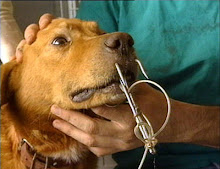Veterinary Specialist's Business Growth Utilizing Stem-Cell Therapy for the Treatment of Dogs
Veterinarian in Huntington Station, New York, cites advances in veterinary medical care and professional interests in preventative medicine for business growth, as well as growth of a relatively rare stem-cell therapy. He is one of a small handful of veterinarians on Long Island who performs endoscopic diagnostic and laparoscopic surgical procedures, orthopedic surgery, ultrasound diagnostics and ultrasound guided surgery.
Huntington Station, NY (PRWEB) June 10, 2009 -- Veterinarian in Huntington Station, New York, cites advances in veterinary medical care and professional interests in preventative medicine for business growth, as well as growth of a relatively rare stem-cell therapy. He is one of a small handful of veterinarians on Long Island who performs endoscopic diagnostic and laparoscopic surgical procedures, orthopedic surgery, ultrasound diagnostics and ultrasound guided surgery.
"Dogs age faster than humans; lucky for them, some areas of medicine are more advanced for veterinary care due to less stringent regulations," Dr. Michel Selmer said. "I am now accredited in Stem Cell Therapy and utilizing stem-cell therapy for the treatment of dogs."
Conditions such as hip-dysplasia and arthritis are being treated with fat cells taken from the patient's own body. Using cells from the dog's own body eliminates the risk of rejection, and the ethical dilemma raised by using embryonic stem cells.
The procedure seems simple enough; fat cells are removed from the dog, sent to the lab where they go through a concentration process, and then are returned to the Advanced Animal Care Center for insertion within 48 hours. The cells are injected near the site of the injury, or degeneration. Pet owners have reported significant improvement in their dogs within the first month.
"I personally am amazed by the stem-cell procedure and I hope that the stiff regulations governing human medicine will either relax somewhat, or embrace this treatment," Dr. Selmer said. "Imagine if we could help our dysplastic dogs run without pain and our arthritic friends could have pain-free mobility. The implications are huge! I know that I'd rather have an injection of my own cells to treat a degenerative joint, rather than an invasive surgery to replace it. I hope that we'll see these medical advancements continue to become more mainstream for our pets and spill over into traditional human medicine - soon!"
Dr. Michel Selmer attended Long Island University (graduating Cum Laude with a BA in Psychology) and earned his Doctorate of Veterinary Medicine in 1995 from Michigan State University. Dr. Selmer owns and operates the Advanced Animal Care Center in Huntington since 1996. In his hospital, Dr. Selmer focuses on minimally invasive diagnostic and surgical techniques, laparoscopic surgeries, ultrasounds, orthopedic surgeries, and endoscopies. Dr. Selmer is an accredited member of the New York State Veterinary Medical Society, as well as the American Animal Hospital Association, and currently is the Vice President of the Long Island Veterinary Medical Society. He is recognized as one of America's top veterinarians by Consumer's Research Council of America for 2006 and 2007. More information is available by calling 631-FOR-PETS or visiting his website at http://www.AdvancedCareForPets.com.
Wednesday, June 10, 2009
Subscribe to:
Post Comments (Atom)




No comments:
Post a Comment